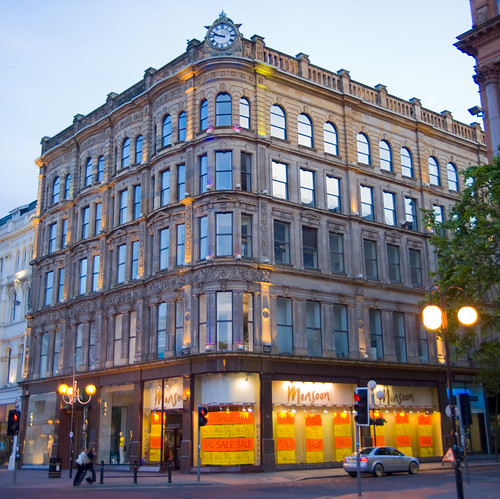ROBERT ANDERSON JP (1837-1921), son of James Anderson, of Corbofin, County Monaghan, married, in 1890, Wilhelmina, daughter of the Rev Andrew Long, of Monreagh, County Donegal.
 |
| Photo Credit: Belfast City Hall |
Mr Anderson, High Sheriff of Belfast, 1903, Lord Mayor of Belfast, 1908-09, High Sheriff of County Monaghan, 1911, was created a baronet in 1911, designated of Parkmount, City of Belfast, and of Mullaghmore, County Monaghan.
 |
| Parkmount House |
The Andersons lived at Parkmount House, Greencastle, County Antrim, which Sir Robert purchased from the McNeill family in 1905.
In 1666 Parkmount was a lodge or occasional residence of Lord Donegall, and it afterwards passed into possession of the Ludford, Cairns and McNeill families.Sir Robert also resided at Mullaghmore House, County Monaghan; and Meadowlands, Balmoral, Belfast.
Meadowlands was beside Balmoral Cemetery, Stockman's Lane.
 |
| Mullaghmore House, County Monaghan |
Sir Robert was the proprietor of Anderson & McAuley, the well-known department store at 1, Donegall Place, Belfast.
1, Donegall Place was originally the location of Stephen May's residence.
Anderson & McAuley was established in 1861, and initially occupied modest two-storey premises known as Donegall Place Buildings (above), built in front of Mr May’s house in 1845.
He was also a director of several other companies, including Arnott's.
IN 1861, two brothers, Robert and Alexander Anderson, went into partnership with John McAuley and established a shop at the corner of Donegall Place and Castle Street. However, the first firm did not prosper, the partnership between the brothers dissolved, and McAuley died in 1888.Following Sir Robert's death in 1921, the baronetcy became extinct.
Robert Anderson continued in the retail business, assisted by George Williams of Hitchcock, Williams and Company, London. By 1895, the firm had become so successful that it moved to a larger, purpose built store. Anderson and McAuley prided itself on a family atmosphere with a business-like approach. It claimed that the secret of its success was ‘courtesy and honest value’.
In 1927, it published the Anderley Gazette as a ‘guide to this house of repute’, which declared that ‘all roads lead to Anderson and McAuley’s, the shopping Centre of Ulster.’ Anderson and McAuley’s were very careful in the selection of their shop assistants, and in the 1930s a position at the store was highly coveted. New female assistants were issued with a standard black dress with snow white collar and advised that ‘scarlet nails and lips plastered with rouge are not an asset to a girl in business.’
Male employees were told that ‘long hair and dirty nails keep many men unemployed.’ In 1953, the first female member of staff was allowed to remain with the company after her marriage. In 1956, the store was one of the first in Northern Ireland to install escalators and people visited the store just to see and experience them. For over a century, shares in the store were held by members of the Anderson family. After Sir Robert’s death in 1921, his nephew James became managing director.
His place was taken by Lady Anderson until her death in 1949; then filled by W H Anderson Esq. In 1979, Anderson and McAuley was one of 200 members of the Association of Independent Stores. It had 374 staff and several stores within the store, including concession departments such as The Ormeau Coffee Shop, Revlon, Windsmoor, Slumberdown, the Minit Heel Bar, and Christy’s towel shop.
After a lengthy market research programme, a major expansion of the store took place in 1989. Customers had criticised Anderson and McAuley’s for being ‘too claustrophobic’. Floor space was increased by 20,000 square feet and six new escalators served every floor. However, the expected raise in sales did not materialise, while high interest rates on the borrowed money for the expansion contributed to the company’s financial difficulties.
Competition from Marks and Spencer, Debenhams and out of town shopping centres ate into the store’s sales. In March, 1994, the last survivor of Belfast’s family owned businesses finally closed its doors. Some 300 members of staff lost their jobs and its valuable stockpile of fixtures and fittings were auctioned.
The closure was seen as marking the end of an era in Belfast’s shopping culture. Today the premises is known as McAuley House and is used by Clarks, The Disney Store, Monsoon and Zara.
Sir Robert and Lady Anderson are both buried at Belfast City Cemetery.
First published in August, 2010.




Mullagmore House, Devon???
ReplyDeleteI know, curious:-
ReplyDeletehttp://en.wikipedia.org/wiki/Anderson_Baronets#Anderson_of_Mullaghmore_House.2C_Devon
He must have had some connection to Devon, it's not unusual for the geographic location to have no relation to the place described.
ReplyDeleteW.
This gentleman looks very impressive rigged out in his robes, like a Lord Mayor should. Reading your account of his life he sounds like someone of distinction with substantial attainments outside politics too. If only the current crop of Twitter politicians with instantaneous views on everything and no real attainments beyond drawing a salary would emulate him.
ReplyDeleteHandellian, wise and sensible words, as ever. Tim.
ReplyDeleteWould love to see something similar about Brand and Norman one day!
ReplyDeleteAnon, I'll certainly consider that. Tim.
ReplyDelete